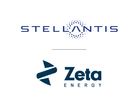How Stellantis and Zeta Energy are Tackling Scope 3

The partnership between Stellantis and Zeta Energy to develop lithium-sulfur battery technology marks a significant milestone in sustainable automotive innovation.
With the potential to transform EV battery performance and reduce emissions across the supply chain, the collaboration aligns with Stellantis' Dare Forward 2030 strategy and its ambitious goal of carbon neutrality by 2038.
Transforming supply chains with lithium-sulfur innovation
Lithium-sulfur battery technology has the potential to alter the EV component supply chain significantly. Using sulfur, a widely available and cost-effective material, the new batteries reduce production expenses and mitigate supply-chain risks.
Sulfur is widely available and cost-effective and reduces both production expenses and supply-chain risk. Zeta Energy's batteries utilise waste materials like methane and unrefined sulfur, eliminating the need for cobalt, graphite, manganese and nickel. The innovation could lead to lower emissions from raw material extraction and processing.
What's more, the technology promises substantial improvements in EV performance, potentially leading to greater adoption. It means potentially a significantly lighter battery pack with the same usable energy as contemporary lithium-ion batteries, enabling greater range, improved handling and enhanced performance.
As EV adoption increases, emissions from sold vehicles are expected to decrease, contributing to a lower carbon footprint.
Meanwhile, lithium-sulfur batteries' improved fast-charging capabilities could enhance energy consumption efficiency and reduce infrastructure requirements. With the potential to accelerate charging speeds by up to 50%, the advancement aligns with the evolving needs of EV users and contributes to a more efficient energy ecosystem.
Sustainable end-of-life solutions | Scope 3 Category 12
Lithium-sulfur batteries' reliance on less toxic and more readily available materials could simplify recycling and disposal processes.
By incorporating waste-derived materials, the batteries are designed to have significantly lower CO2 emissions than existing technologies.
The batteries will be produced using waste materials and methane. They will produce significantly lower CO2 emissions than any existing battery technology, highlighting the potential for reduced emissions during end-of-life treatment.
Reducing Transportation and Distribution Emissions | Scope 3 Categories 4 & 9
The lightweight nature of lithium-sulfur batteries can decrease emissions associated with transporting batteries and vehicles.
Additionally, the technology's compatibility with existing gigafactory infrastructure enables domestic production in Europe or North America, reducing transportation-related emissions within the supply chain.
Zeta Energy battery technology is intended to be manufacturable within existing gigafactory technology and would leverage a short, entirely domestic supply chain.
Driving carbon neutrality with industry expertise
Ned Curic, Chief Engineering and Technology Officer of Stellantis, highlights the strategic importance of the collaboration.
He says: "Our collaboration with Zeta Energy is another step in helping advance our electrification strategy as we work to deliver clean, safe and affordable vehicles.
"Groundbreaking battery technologies like lithium-sulfur can support Stellantis' commitment to carbon neutrality by 2038 while ensuring our customers enjoy optimal range, performance and affordability."
Tom Pilette, CEO at Zeta Energy, points to the broader industry impact: "The combination of Zeta Energy's lithium-sulfur battery technology with Stellantis' unrivalled expertise in innovation, global manufacturing and distribution can dramatically improve electric vehicles' performance and cost profile while increasing the supply chain resiliency for batteries and EVs."
A carbon-neutral future
Stellantis' Dare Forward 2030 strategy includes offering more than 75 battery electric vehicle (BEV) models. The partnership with Zeta Energy reflects its commitment to becoming a carbon net-zero mobility tech company by 2038, prioritising high-performing and affordable EV solutions.
Overall, the collaboration represents a significant leap toward sustainable mobility, promising to reduce Scope 3 emissions across multiple categories while enhancing EV performance and affordability.
The initiative creates transformative impacts on the automotive industry's carbon footprint, driving progress toward a greener future.
Make sure you check out the latest industry news and insights at Scope 3 Magazine and be part of the conversation at our global conference series, Sustainability LIVE and Procurement & Supply Chain LIVE.
Discover all our upcoming events and secure your tickets today. Subscribe to the Scope 3 Magazine newsletter.
Scope 3 Magazine is a BizClik brand.
- Scope 3: Baltic States end Russian Energy DependenceSustainable Procurement
- Maersk Sustainability Reporting: Navigating Scope 3Transportation & Logistics
- SHEIN’s Scope 3 Emissions: Fast Fashion’s Carbon BurdenCircular Economy
- Tackling Super Bowl LIX's Scope 3 Emissions ChallengeScope 1 2 and 3

